Canadian composer Nick Peros is fortunate to have such a fine choir perform his music: besides the ensemble’s unquestionable technical accomplishment, its youthful sound and distinctively clear, bright soprano quality gives a freshness and vitality to each piece whose value to the overall success of the performances can’t be underestimated. As for the music itself–and this by the way, is the first recording of Peros’ work–it’s full of ideas that show both an understanding of vocal writing and the mark of a well-trained student of compositional techniques. He also shows familiarity with stylistic mannerisms of Britten, Bernstein, and Rorem, to name a few. Although this fundamental mastery of mechanics and attention to precedent is fine as far as it goes, as a listener–and certainly as a performer–we’re looking for music that possesses that extra level of creativity, of originality, or that just does something familiar but in some way different from everyone else. And in several of these a cappella motets, we find exactly that. In most, however, we encounter a sameness that follows patterns we discover after the first three or four of the 20 pieces.
One of the more successful motets is the first, Love & Faithfulness. It’s not easy to write music like this–four parts, relentlessly rushing in note-and-syllable-heavy imitation–without it sounding either like chaos unleashed or just falling apart of its own incompatible complexity. It works because Peros keeps focused on making his statement and getting out–and not trying to elevate his simple idea by introducing more material. On the other hand, the two-part women’s piece, Blessed is the Man, sounds more like an interesting compositional exercise than a finished piece of concert music. Its basic thematic idea just gets overworked until the initially intriguing sounds of the interacting–almost dueling–voices becomes irritating. This isn’t helped by the recording, which just slightly distorts the highest, loudest tones. Likewise, All Glorious is the Princess collapses under its own weight–too much squeezing and stretching of weak thematic material. Combined with relentlessly dense textures and an open-ended harmonic scheme that effectively resists, indeed cleverly seems to push farther and farther away from, a tonal center, the piece drags us into a thicket and leaves us tangled there. The same goes for O God you are my God.
But the two-part And I in righteousness, a sensuously flowing meditation for women’s voices, just carries us willingly along, the music assuring us of the text’s promise that “when I awake, I will be satisfied with seeing your likeness.” One of the best all-around motets is the four-part I call on you O God, which shows a skillful integration of the edgy harmonies with texture and melodic material that stands perfectly proportioned to the length and meaning of the text. Another standout is the four-part How long O Lord, where Peros gets full control of his textural, harmonic, and melodic ideas. Many of these pieces sound too much like exercises, like etudes, because the devices used–imitation (Blessed is the man), thematic repetition (Where morning dawns), indeterminate harmonic progressions (too many to name), and so on, are so blatant and/or repetitive that they draw attention to themselves at the expense of textual meaning or of any intended overall effect. Sometimes, when several ideas converge, as in the drone-and-flowing-melody of I will praise you, O Lord, the effect is starkly stunning. Peros offers some wonderful uses of chromaticism–He reached down from on high–and densely scored harmony; and when he focuses on just following the natural lead of a melody (And I in righteousness), the results can be quite lovely and memorable. This kind of music can hold up to many hearings, and taken individually there are several pieces in this so-called “cycle” that could stand alone. As you can see, there’s a lot here to digest–the proverbial mixed bag–and it would be wrong to conclude that Peros isn’t on to something here. He is. But he needs to refine and conserve here, expand and be more free there, and then he not only will be on to something, he will have something–and so will we.
































